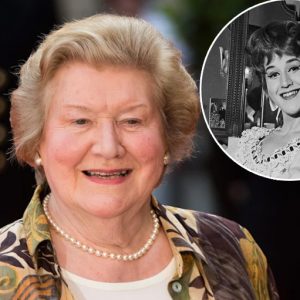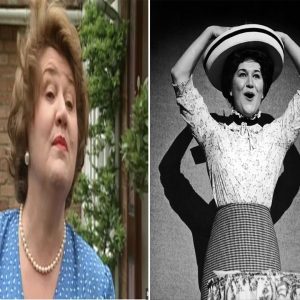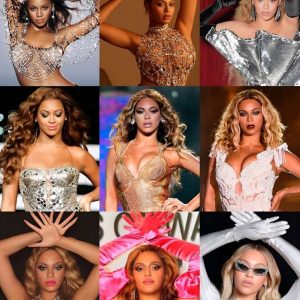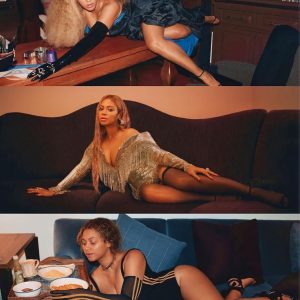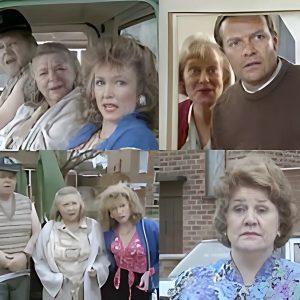A Legacy of Laughter: Dame Patricia Routledge Reflects on the Enduring Power of Keeping Up Appearances
Three decades after she first burst onto British television screens with a shrilly pronounced “Bouquet,” Dame Patricia Routledge is once again in the spotlight, reflecting on the legacy of her most iconic creation—Hyacinth Bucket. The BBC sitcom Keeping Up Appearances, which ran from 1990 to 1995, may have ended long ago, but its influence continues to ripple through generations of viewers who still find comfort and joy in the chaos of Hyacinth’s meticulously curated life.
In the Channel 5 documentary Keeping Up Appearances: 30 Years of Laughs, the now 96-year-old Dame Patricia opened up with warmth, wit, and a deep sense of gratitude. “There are people who can’t really get beyond Keeping Up Appearances if they think about me,” she admitted, “but it did make a great difference, and I do get the most wonderful letters.” Her words echo the impact that comedy can have—not just as entertainment, but as emotional refuge.
Indeed, the legacy of Keeping Up Appearances is far more than a string of running gags or exaggerated snobbery. Routledge shared a poignant memory of receiving a letter from a woman in despair, who had turned on the television in a moment of crisis. “She made herself a cup of tea, sat down, turned the set on—and there I was,” Routledge recounted. “It helped her through a very, very difficult time. It makes it all thoroughly worthwhile.”
Created by writer Roy Clarke, the sitcom revolved around Hyacinth Bucket (pronounced “Bouquet,” as she so frequently reminded everyone), a pretentious and socially aspirational woman whose tireless efforts to rise above her working-class roots led to endless comedic misadventures. Opposite her were long-suffering husband Richard (Clive Swift), slovenly relatives Daisy and Onslow (Judy Cornwell and Geoffrey Hughes), and a revolving door of unfortunate guests who bore the brunt of Hyacinth’s social climbing.
What made Hyacinth unforgettable was not just her absurdity, but the deep humanity that Routledge brought to the role. Beneath the façade of superiority was a woman who longed to be seen, respected, and loved. It was a character rich with comedic contradiction, and audiences responded with enthusiasm across continents.
Royalty, it turns out, was no exception.

“We were one of the Queen Mother’s favourite sitcoms, which was lovely,” Routledge revealed in the documentary, with a twinkle in her eye. “And the Queen enjoyed it, too. Hyacinth would have been flattered beyond words—and why not?” The character’s obsession with propriety and social status would no doubt have been tickled pink by her place in royal favor.
Yet for all her affection for the role, Routledge was deliberate and decisive when it came time to walk away. In the BBC Four special Patricia Routledge Remembers, she explained the reasoning behind her difficult decision to end the show: “I thought the writer was beginning to recycle old ideas. And also, remembering the glorious Ronnie Barker, he always stopped when he was at the height of something. He always left with people saying, ‘Oh, aren’t you doing any more?’ Rather than people saying, ‘Is that still on?’”
That instinct—to leave while the audience was still hungry for more—proved to be one of the most powerful decisions of her career. “That’s the place to be, really,” she said with quiet pride. “And I had other adventures to explore. I’m an actress, and I wanted to take on the stories of other people.”
And explore she did. Far from retreating from the spotlight, Routledge went on to star in the popular crime drama Hetty Wainthropp Investigates, bringing depth and determination to the role of an amateur sleuth navigating life’s second act. On stage, she was equally commanding, taking on canonical roles like Lady Bracknell in The Importance of Being Earnest with razor-sharp delivery and impeccable timing.
Still, the character of Hyacinth—whose very name conjures up teacups, floral arrangements, and social faux pas—remains one of the most enduring figures in British television history. The moment Routledge read the script, she knew she had struck comedic gold. “I had opened the script for a moment at one o’clock in the morning, read straight through—and Hyacinth leapt off the page,” she recalled. “I knew that woman. I knew several of that woman,” she added, laughing.
That intuitive understanding of the character allowed Routledge to shape Hyacinth into a figure that was both ridiculous and strangely sympathetic. Audiences didn’t just laugh at her—they rooted for her. Her delusions were grand, her efforts exhausting, but her commitment to her ideals—however misplaced—was oddly admirable.
Today, reruns of Keeping Up Appearances continue to air around the world, introducing Hyacinth to new generations who might not recognize a milkman from a major but understand, implicitly, what it means to long for something just out of reach. And for all the laughter she’s given, Routledge remains deeply humbled by her place in viewers’ lives.
“Comedy is no small thing,” she said. “It connects people. It heals. And it lasts.”
As Hyacinth might say, it’s not just about keeping up appearances—it’s about leaving a legacy. One of elegance, eccentricity, and enduring joy.
Would you like a visual timeline or character breakdown from the series to accompany this piece?
